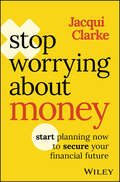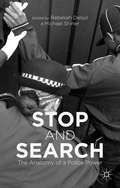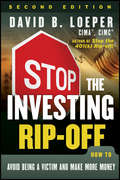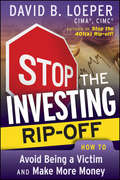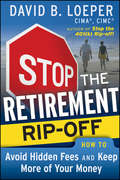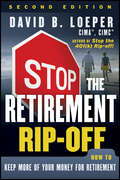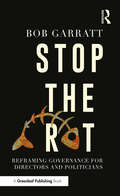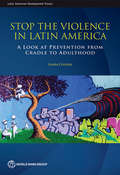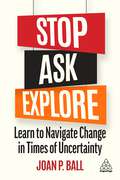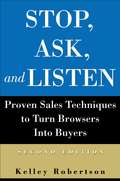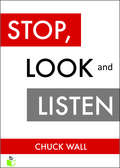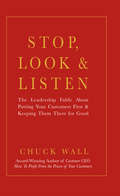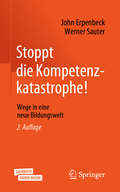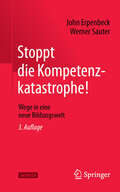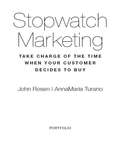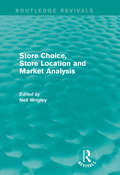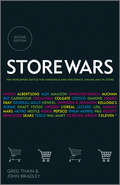- Table View
- List View
Stop Worrying about Money: The AWARD-WINNING book about how you can start planning now to secure your financial future
by Jacqui ClarkeWINNER of the Chanticleer International Book Awards Harvey Chute Grand Prize for Business, Enterprise & Finance1st Place for Instructional and Insightful Nonfiction, Chanticleer International Book AwardsRunner-up BEST BOOK at the Money Awareness & Inclusion Awards 2025Take control of your money, avoid common financial pitfalls, and prepare for whatever life throws at you In Stop Worrying about Money, Jacqui Clarke, Australia’s best-kept money secret, delivers smart and sure-fire guidance that will see you through life’s financial ups and downs. You’ll learn to clarify your values, set goals, and be upfront and honest about your money—both with yourself and with others. Fact: Money comes in and goes out. The cost of living is ever increasing, big changes can come as big surprises and sometimes you’re stuck just trying to keep on top of everything. It’s time to hit pause on the distractions and get wise with your finances. With Stop Worrying about Money, you’ll re-assess what financial independence and freedom mean to you. This is the guide that will help you build a less stressful, more empowering relationship with money, starting today. You’ll discover how to: Build financial security for yourself and your family Set meaningful (and within-your-means) money goals Combat expense creep and avoid other typical money traps Overcome setbacks and become a master planner A practical and hands-on guide to dealing with life’s most common and challenging financial obstacles, Stop Worrying about Money is the energising, no-nonsense financial wake-up call that you’ve been waiting for.
Stop and Search
by Michael Shiner Rebekah DelsolStop and search is often billed as a vital tool in the fight against crime, yet its use remains controversial. Anger and resentment over the misuse of this tactic were widely implicated among the causes of serious public disorder in 1981 and again in 2011, fuelling an ongoing cycle of crisis and reform that has engulfed British policing. This edited collection provides a detailed assessment of stop and search by leading experts in the field. It considers the legal basis of stop and search,the purpose and function of these powers, their effectiveness in tackling crime and their impact on trust and confidence in the police. Stop and Search: The Anatomy of a Police Power directly addresses some of the most controversial aspects of stop and search, including its disproportionate use on people from black and minority ethnic groups, its role in counter-terrorism policing and ongoing attempts at regulation and reform. While the main focus is on England and Wales, the collection shows that the challenges posed by stop and search are fundamental to the policing of diverse, democratic societies across the globe. Includes a foreword by Robert Reiner, Emeritus Professor of Criminology, London School of Economics and Political Science, UK.
Stop the Investing Rip-off: How to Avoid Being a Victim and Make More Money
by David B. LoeperThe questions every investor should ask before parting with their hard-earned cash This book serves as an advocate of the consumer and brings to light what insiders know about the side of the sales pitches that consumers don't, but need to hear. Stop the Investing Rip-Off reveals the questions every investor should ask during a financial sales pitch before they pull the trigger and buy the next mutual fund, stock, advisory service, or other investment product. Based on David Loeper's nearly twenty-five years of experience of seeing the inner workings of the industry, this updated edition of his classic book offers new strategies based on the performance of the stock market over the past two years. Sheds light on the oft unseen deceit of the financial services industry An updated and revised edition of the bestselling Stop the Investing Rip-Off Written by David Loeper who is regularly quoted in Kiplinger's Money and Investment News and regularity contributes to Forbes Intelligent Investing Stop the Investing Rip-Off, Revised and Updated is filled with advice for investors who want to avoid becoming victims of smooth talking salespeople and the effective advertising and marketing campaigns designed to evade reality and prey on your emotional desires.
Stop the Investing Rip-off: How to Avoid Being a Victim and Make More Money
by David B. LoeperThe Investing Rip-Off How can you tell whether an advisor is conflicted or looking out for your best interests? What questions should you ask when making important investment decisions? How can you select investments that avoid needless expenses and risk? As investors, many of us have put our faith in the financial services industry when it comes to the stewardship of our wealth. Unfortunately, the industry has consistently failed us on this front. The financial services industry—including banks, brokerages, and insurance companies—is unique among all others. Through effective advertising and marketing, it's been able to evade being painted with the brush other underperforming industries have, and in most cases, their well-designed sales pitch has allowed them to effectively prey on the emotional desires of investors. Based on author David Loeper's nearly twenty-five years of experience with this industry's inner workings, Stop the Investing Rip-off reveals the real costs of the investments we make, details the false and misleading information sold to us, and discusses the devastating effects they can have on personal wealth. With this book as your guide, you'll gain invaluable insights into the major segments of the financial services industry, how they spin their offerings, and the questions you need to ask before committing any money to a financial product or service you may be interested in. Filled with in-depth insights and practical advice, Stop the Investing Rip-off sheds much-needed light on the often-unseen aspects of the financial services industry—exposing what¿only insiders know—and shows you how to avoid the conflicts of interest that could compromise your financial well-being.
Stop the Meeting Madness
by Leslie A. Perlow Eunice Eun Constance N. Hadley"The Challenge Meetings are supposed to improve creativity and productivity—but they do the opposite when they’re excessive, badly scheduled, poorly run, or all three. These problems take a toll on the whole organization, and they require systemic fixes. The Solution Groups must first figure out what kind of time their meetings tend to waste—group, individual, or both. They can then follow a five-step process for change: (1) collect impressions from each member; (2) interpret those together; (3) choose a group goal for improving meetings that feels personally relevant and motivating; (4) measure progress; and (5) regularly check in to make sure people don’t revert to old patterns."
Stop the Retirement Rip-off: How to Avoid Hidden Fees and Keep More of Your Money
by David B. LoeperSaving for retirement is a difficult task, especially during these challenging economic times. <P><P>Individuals who participate in their retirement plans are being charged billions in fees annually--and no one is looking out for their best interests--even though the laws say both plan sponsors and employers should be held responsible for acting in their employees' best interests. <P>The fact is that unless individuals are willing to stand-up and secure their financial future, they're likely to face less money in their retirement plan accounts and have to work longer to accumulate the funds they need for retirement. In Stop the Retirement Rip-off, author David Loeper provides the necessary tools for readers to take action and make the most of their retirement plans. It offers a road map for employees to understand the fees and costs associated with their plans; as well as improve their standing within their company by proactively helping their employer to take needed action. The book features a non confrontational positive approach to bringing your retirement plan problems to the attention of your employer. Written in a straightforward and accessible style, Stop the Retirement Rip-off provides readers with sensible strategies for making the most of their retirement funds, and will put them back in control of their financial future.
Stop the Retirement Rip-off: How to Keep More of Your Money for Retirement
by David B. LoeperA detailed guide for avoiding the pitfalls of retirement funding In Stop the Retirement Rip-Off, author David Loeper provides the necessary tools for investors to take action and make the most of their retirement plans. It offers a road map for employees to understand the fees and costs associated with their plans; document the excesses in a presentation to management; then organize themselves to protest and, if necessary, bring the documentation to the Labor Department in a complaint. Written in a straightforward and accessible style, this book is filled with sensible strategies for making the most of retirement funds and putting future retirees back on the right financial track. Filled with strategies that can help employees stand up and secure their financial future Addresses how to make the most of your money, and your life, after fixing your retirement plan Outlines a practical approach to understanding your organization's retirement plan and overcoming its potential inefficiencies This important book contains the much-needed information that employees need to plan for retirement and ensure a secure financial future.
Stop the Rot: Reframing Governance for Directors and Politicians
by Bob GarrattFollowing the international success of The Fish Rots from the Head: Developing Effective Directors, this sequel from Bob Garratt explains the public's distrust of the people who govern us - the directors, owners, regulators and politicians - and how this can be changed. Currently, Corporate Governance is too narrow and fragmented. The growing gap between the angry public and the urban elite, made manifest by Brexit and Trump, is due to a lack of appreciation by both parties of the roles and values of well-governed organisations in bonding a society at both national and international levels. This book pulls no punches and directly challenges directors and politicians to reframe their thinking about 'governance' to address the public's distrust of them. This is the ROT that needs to be STOPPED. This book is truly radical in going back to basics and then designing a new national action learning system between the four main players overseen by continuous public scrutiny. It is designed to counter the official reports of organisational failure that end too frequently with the weasel words 'but the main problem was a failure of corporate governance'. Currently this is code for 'so no-one can do much about it'. This book shows what can be done. The book explains how the disjointed responses to the angry public have resulted in a series of unhelpful regulations made worse by their thoughtless application. This reaction has reduced the chances of directors being able to deliver their main purpose - ensuring the future of their business by better understanding the complexities of their future financial, social and environmental policies and enabling improved creativity and thoughtful risk-taking. Stop the Rot sets governance in a much wider social context. The acceptance of global Human Values in all of our organizations, with their necessary ethics and behaviours, ensures the development of Inclusive Capitalism to the advantage of all.
Stop the Violence in Latin America: A Look at Prevention from Cradle to Adulthood
by Laura ChiodaThe Latin America and Caribbean (LAC) region has the undesirable distinction of being the world's most violent region, with 24.7 homicides per 100,000 inhabitants. The magnitude of the problem is staggering and persistent. Of the top 50 most violent cities in the world, 42 are in LAC. In 2010 alone, 142,302 people in LAC fell victim to homicide, representing 390 homicides per day and 4.06 homicides every 15 minutes. Crime disproportionately affects young men aged 20 to 24, whose homicide rate of 92 per 100,000 nearly quadruples that of the region. The focus of Crime Prevention in Latin America and the Caribben is to identify policy interventions that, whether by design or indirect effect, have been shown to affect antisocial behavior early in life and patterns of criminal offending in youth and adults. Particular attention is devoted to recent studies that rigorously establish a causal link between the interventions in question and outcomes. This publication adopts a lifecycle perspective and argues that as individuals progress through different stages of the lifecycle, not only do different sets of risk factors arise and take more prominence, but their interactions and interdependencies shape human behavior. These interactions and the relative importance of different sets of risk factors identify relevant margins that can effectively be targeted by prevention policies, not only early in life, but throughout the lifecycle. Indeed prevention can never start too early, nor start too late, nor be too comprehensive.
Stop, Ask, Explore: Learn to Navigate Change in Times of Uncertainty
by Joan P. BallInterruptions and disruptions are a threshold to uncharted territory. You can learn to navigate uncertain transitions - and to flourish in times of unrelenting change. This book offers readers a practical framework for navigating life's inevitable turning points, thresholds and transitions - at work, at home and in between. Drawing upon more than a decade of research and work with established and emerging leaders across the globe, leadership consultant, Joan P. Ball invites you to reimagine your relationship with uncertainty and recognize the creative potential that exists in the messy middle between life's inevitable What Now? Moments and what comes next.Stop, Ask, Explore is a lively and eye-opening book that will allow you to more effectively engage interruptions and disruptions and develop the experimental mindset needed to flourish in an era of unrelenting and exponential change. Discover the power of curiosity, wayfinding, and discernment to make sense of uncharted territory and learn to thrive in times of uncertainty.
Stop, Ask, and Listen: Proven Sales Techniques to Turn Browsers Into Buyers
by Kelley Robertson"This book gives every sales professional, in any market, a step-by-step process to make more sales, faster and easier than ever before. Worth its weight in gold!" —Brian Tracy, President, Brian Tracy International, and Author of Advanced Selling Strategies Does the sheer thought of selling make you nervous and uncomfortable? Do you find it difficult to overcome price objections? Do you wish you could close more sales with less effort? You are not alone. Most people are not natural-born sales professionals. Making a sales call stresses us out. Meeting our sales targets month after month is difficult and frustrating. We make a living but we know we could do better, close more sales, and earn more money. Selling does not have to be difficult. Now you can quickly and easily learn the techniques used by top retail sales people. They are deceptively simple, yet extremely effective. What’s more, they can be used by sales professionals in any business to improve their results. Stop, Ask & Listen: Proven Sales Techniques to Turn Browsers Into Buyers will show you: The 11 most common mistakes sales people make and how to avoid them. How to create a connection with your potential customer quickly and easily. The 33 questions that will gain your prospect’s trust. How to deliver an engaging and captivating sales presentation. A four-step process to overcome virtually any objection. Lots of examples, sample scripts, and action plans you can use to apply the concepts in the book, no matter what you sell. Whether you are new to selling, an experienced veteran, or a sales manager training, supervising, and coaching a team, you will learn valuable strategies that will help you increase your sales and earn more money.
Stop, Look, & Listen: The Customer CEO Business Fable About How to Profit from the Power of Your Customers
by Chuck WallSales have dropped precipitously. The board is meeting next week. Bob, founder and long-time CEO, is urged by his team to hire an expensive management consulting firm and drastically cut costs as a last ditch effort to improve the company's bottom line.Stop, Look, and Listen is the story of how Bob puts the principles put forth in Chuck Wall's Customer CEO: How to Profit from the Power of Your Customers to work. Bob has been running his company as if he controls the customers. Bob is urged to Stop, Look, and Listen, because today, the customers are in control. They are the bosses, the Customer CEOs, and they control the company's destiny.Bob must learn to understand his customers' needs, and more importantly, embrace their power. The three essential steps are to STOP seeing things from the corporate CEO's point of view, LOOK at everything from the customer's point of view, even when it hurts, and LISTEN deeply for what the customers' needs are. This short, entertaining business tale chronicles Bob's ultimate recognition of his customers as CEOs.Author Chuck Wall is an expert in understanding the needs of customers, having interviewed and surveyed more than 100,000 of them in virtually every business category. Chuck has helped hundreds of companies, from the Fortune 100 to start-ups, acquire hundreds of thousands of new customers.
Stop, Look, and Listen: The Leadership Fable About Putting Your Customers First and Keeping Them There for Good
by Chuck WallSales have dropped precipitously. The board is meeting next week. Bob, founder and long-time CEO, is urged by his team to hire an expensive management consulting firm and drastically cut costs as a last ditch effort to improve the company's bottom line. Stop, Look, and Listen is the story of how Bob puts the principles put forth in Chuck Wall's Customer CEO: How to Profit from the Power of Your Customers to work. Bob has been running his company as if he controls the customers. Bob is urged to Stop, Look, and Listen, because today, the customers are in control. They are the bosses, the Customer CEOs, and they control the company's destiny. Bob must learn to understand his customers' needs, and more importantly, embrace their power. The three essential steps are to STOP seeing things from the corporate CEO's point of view, LOOK at everything from the customer's point of view, even when it hurts, and LISTEN deeply for what the customers' needs are. This short, entertaining business tale chronicles Bob's ultimate recognition of his customers as CEOs.
Stopping Corporate Misdeeds: How We Teach the Wrong Lessons
by Jeffrey PfefferThis chapter investigates the persistence of unethical behavior in business, pointing to lack of consequences as a possible root cause.
Stopping Identity Theft
by Scott MiticTen simple steps you can take to protect yourself or your family from the fastest growing crime in America. What to do now to safeguard your bank accounts, online presence, credit record and more from the horror and financial damage of identity theft. An identity theft is stolen every four seconds in the U.S., while the Federal Trade Commission reports that more than eight million people (a growing number of which are children) are victims of identity theft every year ñ with resulting losses of more than $15 billion, annually. Written by a national expert on identity theft and Founder of TrustedID, a leading provider of comprehensive identity theft solutions, this book gets right to the point, offering action-oriented advice designed to prevent identity theft. Find out why shopping in stores can be more dangerous than shopping online. Spot scammers, like telephone "surveyors" asking about your pet's name hoping it's the password to your online accounts. Discover how to do online social networking without getting conned by a fake ìfriend.î Understand the latest identity theft tricks, like phishing, pharming, and skimming. Learn why old-fashioned checks can the riskiest way to pay for something. Protect yourself while traveling abroad. Stopping Identity Theft offers a ten-step program that covers medical identity theft, the safeguarding of accounts and personal and public records, safe storage and disposal of personal information, and more ñ including how to be an informed identity theft victim if you should become one. Another in the bestselling USA TODAY/Nolo series of books, Stopping Identity Theft addresses this timely topic ñ its past, present and future ñ by combining legal expertise with engaging inside tips, stories and graphics.
Stoppt die Kompetenzkatastrophe!: Wege in eine neue Bildungswelt
by John Erpenbeck Werner SauterDieses Buch zeigt Ihnen, warum unsere Gesellschaft in eine Kompetenzkatastrophe schlittertJohn Erpenbeck und Werner Sauter vertreten in diesem Buch eine radikale These: Unsere Gesellschaft wird von der Kompetenzkatastrophe überrollt. Seit der ersten Auflage dieser Streitschrift haben sich wirkungsstarke Initiativen entwickelt, um Lösungen für die aktuellen Herausforderungen in der Bildung zu entwickeln und umzusetzen. Hinzu kommen unzählige richtungsweisende Einzelprojekte von engagierten Lehrern, Dozenten oder der betrieblichen Aus- und Weiterbildung. Doch aus Sicht der Autoren ist das noch nicht genug – im Gegenteil. Sie sind der Meinung, die Situation habe sich noch deutlich zugespitzt. Vor allem mit Blick auf die Digitalisierung stellen Erpenbeck und Sauter in diesem Werk neue Anforderungen an das Bildungssystem. Jedoch blockierten Schulen, Hochschulen und berufliche Bildung mehrheitlich die notwendige Entwicklung einer neuen Werte- und Kompetenzgesellschaft. Daher analysieren beide Autoren in diesem Buch die von Ihnen proklamierte Kompetenzkatastrophe, weisen auf innovative Wege zu ihrer Überwindung hin und fordern konkrete Bildungsreformen für die Gesellschaft. Mit diesen Impulsen wenden Sie die Katastrophe noch rechtzeitig abIm ersten Abschnitt dieses Buchs beschreiben John Erpenbeck und Werner Sauter, wie sie den Begriff Kompetenzkatastrophe definieren und stellen dieses Konzept der Wissenskatastrophe gegenüber. In den anschließenden Kapiteln setzen sich die Autoren u. a. mit diesen Aspekten und Fragestellungen auseinander:Wissensblödigkeit und KompetenzintelligenzKannten unsere Altvorderen keine Kompetenzen?Kompetenzentwicklung und PISAWissensweitergabe oder Kompetenzentwicklung an UniversitätenKann man Kompetenz lehren?Gehirn, Gehirnmechanik und SelbstorganisationInformations-, Wissens- und Kompetenzgesellschaft Für die Autoren stellt das bisherige Konzept des Bildungssystems – nämlich Wissens- statt Kompetenzweitergabe – eine große Gefahr dar. Mit diesem Werk fordern Erpenbeck und Sauter, in den Lehrplänen und damit auch in Unterrichtsformen aller Art Eigenverantwortung und Selbstorganisation stärker in den Mittelpunkt zu rücken. Denn nur unter realen Anwendungssituationen könnten sich Fähigkeiten ausbilden. Auf diese Weise liefert Ihnen dieses Buch konkrete Handlungsempfehlungen, um die Kompetenzkatastrophe schnellstmöglich aufzuhalten.
Stoppt die Kompetenzkatastrophe!: Wege in eine neue Bildungswelt
by John Erpenbeck Werner SauterSeit der ersten Auflage dieser Streitschrift haben sich wirkungsstarke Initiativen begründet, um Lösungen für die aktuellen Herausforderungen in der Bildung zu entwickeln und umzusetzen. Hinzu kommen unzählige richtungsweisende Einzelprojekte von engagierten Lehrern, Dozenten oder betrieblichen Aus- und Weiterbildnern, die häufig der Öffentlichkeit nicht bekannt werden. Also sind wir auf einem guten Weg? Leider nein!Die Katastrophe hat sich im Gegenteil noch deutlich zugespitzt. Unsere Welt verändert sich rasend mit zunehmender Geschwindigkeit und mit ihr die Anforderungen an uns. Wir benötigen heute völlig neue Fähigkeiten, um uns in der zunehmend digitalen Welt mit Künstlicher Intelligenz zurechtzufinden und trotzdem menschengerecht zu handeln. Diesen Anforderungen wird das Bildungssystem immer weniger gerecht. Sein Grundprinzip – Wissensweitergabe statt Kompetenzentwicklung – führt direkt in eine Bildungskatastrophe.Die künftige Arbeitswelt wird eine Kompetenzwelt sein, in der Werte als Handlungsanker für selbstorganisierte Prozesse mit digitalisierten Systemen und virtuellen Assistenten dienen. Die Digitalisierung führt dabei zu einem radikalen Wandel des Lernens. Schulen, Hochschulen und berufliche Bildung blockieren jedoch mehrheitlich die notwendige Entwicklung der Werte- und Kompetenzgesellschaft. John Erpenbeck und Werner Sauter analysieren diese Kompetenzkatastrophe und weisen Wege zu ihrer Überwindung.Die dritte Auflage wurde unter dem Aspekt der aktuellen rasanten Entwicklungen im Bereich Künstlicher Intelligenz grundlegend aktualisiert und ergänzt.
Stopwatch Marketing
by Annamaria Turano John RosenHow long does it take to buy a loaf of bread? A pair of shoes? A car? These are trick questions. Imagine a hundred potential customers in the same store, each holding a stopwatch. Some of their stopwatches are ticking very fast (grabbing a bottle of wine before a party), some glacially slow (agonizing over the perfect bottle for a first date). Some, in fact, aren't ticking at all. For today's savvy marketers understanding how much time and energy consumers are willing to spend shopping for their product or service is the single most important (yet overlooked) factor in maximizing sales. After years of advising clients who sell everything from all-natural fruit juice to health insurance, John Rosen and AnnaMaria Turano have learned that capturing a consumer's attention at precisely the right time and holding it through the purchase decision requires a strategy that they call Stopwatch Marketing. It is the method of adjusting your marketing strategies to match the shopping styles of your customers. Stopwatch Marketing unveils a systematic way to capitalize on four different types of shopping styles--Recreational, Painstaking, Impatient, and Reluctant. Rosen and Turano also share the stories of how America's top brands put the concept of Stopwatch Marketing to work for them. You'll learn how: Goodyear turned Assurance with TripleTred tires into a billion-dollar success story built on a shopping cycle that takes less than an hour. Roto-Rooter became the only legitimate brand in its category by controlling the typical Yellow Pages users' 50-second search pattern. Whole Foods reinvented the supermarket shopping experience to slow down their customers' clocks. Microsoft exploits shoppers' reluctance to spend time researching alternatives to their Office software. Lexus begins targeting customers up to a year before they set foot inside a dealer showroom. In a world where consumers are assaulted with thousands of different marketing messages every day, the biggest challenge is to align the content and timing of your messages to the amount of time buyers have for hearing them.Stopwatch Marketing shows how to do just that and increase your bottom line as a result.
Stopwatch Marketing
by John Rosen ¦ AnnaMaria TuranoHow long does it take to buy a loaf of bread? A pair of shoes? A car? These are trick questions. Imagine a hundred potential customers in the same store, each holding a stopwatch. Some of their stopwatches are ticking very fast (grabbing a bottle of wine before a party), some glacially slow (agonizing over the perfect bottle for a first date). Some, in fact, aren’t ticking at all. For today’s savvy marketers understanding how much time and energy consumers are willing to spend shopping for their product or service is the single most important (yet overlooked) factor in maximizing sales. After years of advising clients who sell everything from all-natural fruit juice to health insurance, John Rosen and AnnaMaria Turano have learned that capturing a consumer’s attention at precisely the right time and holding it through the purchase decision requires a strategy that they call Stopwatch Marketing. It is the method of adjusting your marketing strategies to match the shopping styles of your customers. Stopwatch Marketing unveils a systematic way to capitalize on four different types of shopping styles-Recreational, Painstaking, Impatient, and Reluctant. Rosen and Turano also share the stories of how America’s top brands put the concept of Stopwatch Marketing to work for them. You’ll learn how: Goodyear turned Assurance with TripleTred tires into a billion-dollar success story built on a shopping cycle that takes less than an hour. Roto-Rooter became the only legitimate brand in its category by controlling the typical Yellow Pages users’ 50-second search pattern. Whole Foods reinvented the supermarket shopping experience to slow down their customers’ clocks. Microsoft exploits shoppers’ reluctance to spend time researching alternatives to their Office software. Lexus begins targeting customers up to a year before they set foot inside a dealer showroom. In a world where consumers are assaulted with thousands of different marketing messages every day, the biggest challenge is to align the content and timing of your messages to the amount of time buyers have for hearing them. Stopwatch Marketing shows how to do just that and increase your bottom line as a result. .
Store Choice, Store Location and Market Analysis (Routledge Revivals)
by Neil WrigleyThis book, first published in 1988, brings together leading researchers from both the retailing business and the academic world to discuss the latest techniques of analysis and forecasting in the fields of store choice, store location, and market analysis. Its rationale is the major restructuring of the UK retailing industry which has taken place over the past twenty years, and the profound implications of that restructuring for the type of research necessary to understand, maintain and enhance corporate responsibility. The contributors present accounts of the development of new and original methods for retail analysis and forecasting purposes. They lay stress upon practical methods which are accurate and robust, and which can operate with the type of data typically available to retailers. The book will provide a major work of reference for retailers, market researchers, retail analysts, estate managers, urban planners and geographers in many countries.
Store Environments: Tips on How to increase sales in the small businesses
by Solange JuvellaThis book seeks to demonstrate to the managers of small businesses the importance of store environments in creating the necessary conditions for sales to be done. Although the book is based on scientific studies and texts, it uses accessible language which makes the book easy to understand and the presented concepts to be applied.
Store Wars
by Greg Thain John BradleyThe sequel to the highly successful Store Wars: the battle for mindspace and shelfspace published in 1995. The new edition will retain all the strengths of the old book including a comprehensive and complex approach to the consumer & retail market and the interaction between FMCG retailers and manufacturers. The book will be thoroughly revised and updated and will consist of 4 main parts: A section on leading FMCG companies and brands (such as Coke, P&G, Unilever, Nestle, L'Oreal etc. ), their marketing and branding strategies in the western markets (USA, Western Europe: UK, France, Germany and others). A section on leading retailers (Wal-Mart, Tesco, Carrefour etc. ), their developments and expansion over the last 10 years. A section describing the interaction between retailers and manufacturers, including competition for end-consumers, trade marketing. A section covering the Emerging Markets--the retail landscape in the major developing economies, results of the expansion of major FMCG brands and western retail chains, challenges related to distribution and FMCG marketing in those countries. The book will also discuss the impact of the Global Crisis on the consumer and retail markets as well as predictions and prospects for the future.
Store24
by V. G. Narayanan Dennis Campbell Susan KulpIllustrates how nonfinancial performance measures can be used to manage a business and evaluate the success of a strategy.
Store24 (A): Managing Employee Retention
by Dennis Campbell Frances X. FreiProvides a retailing context in which employee retention strategies are explored through analyzing detailed store-level data.
Store24 (B): Service Quality and Employee Skills
by Dennis Campbell Frances X. FreiSupplements the (A) case.
